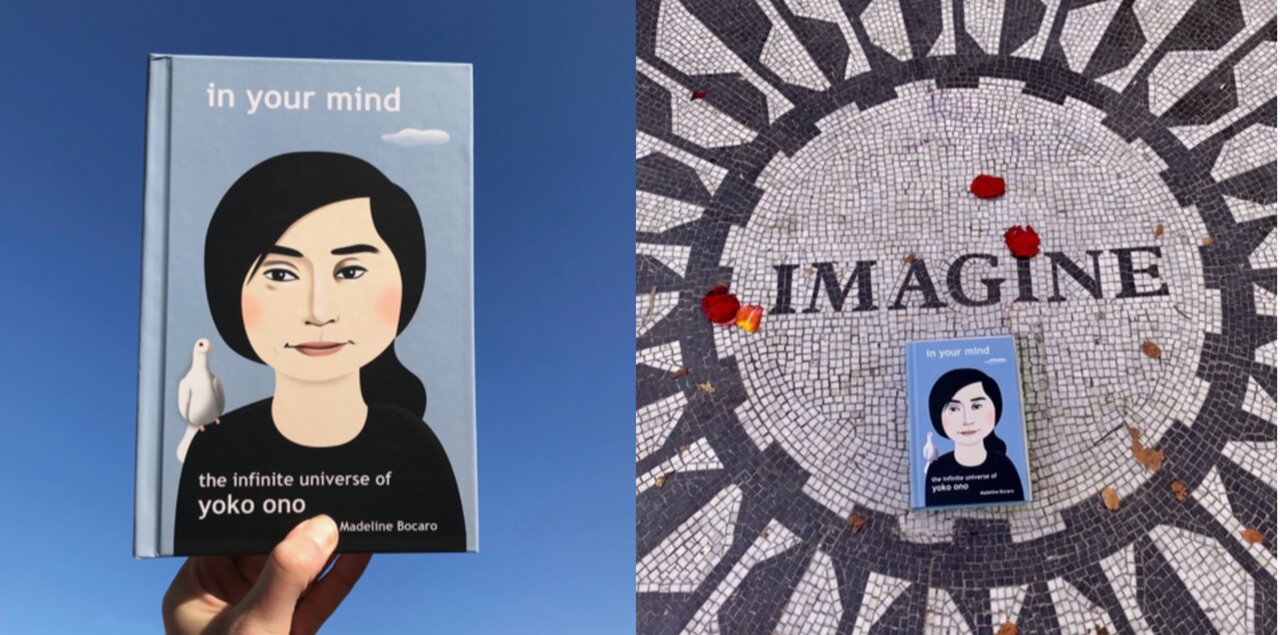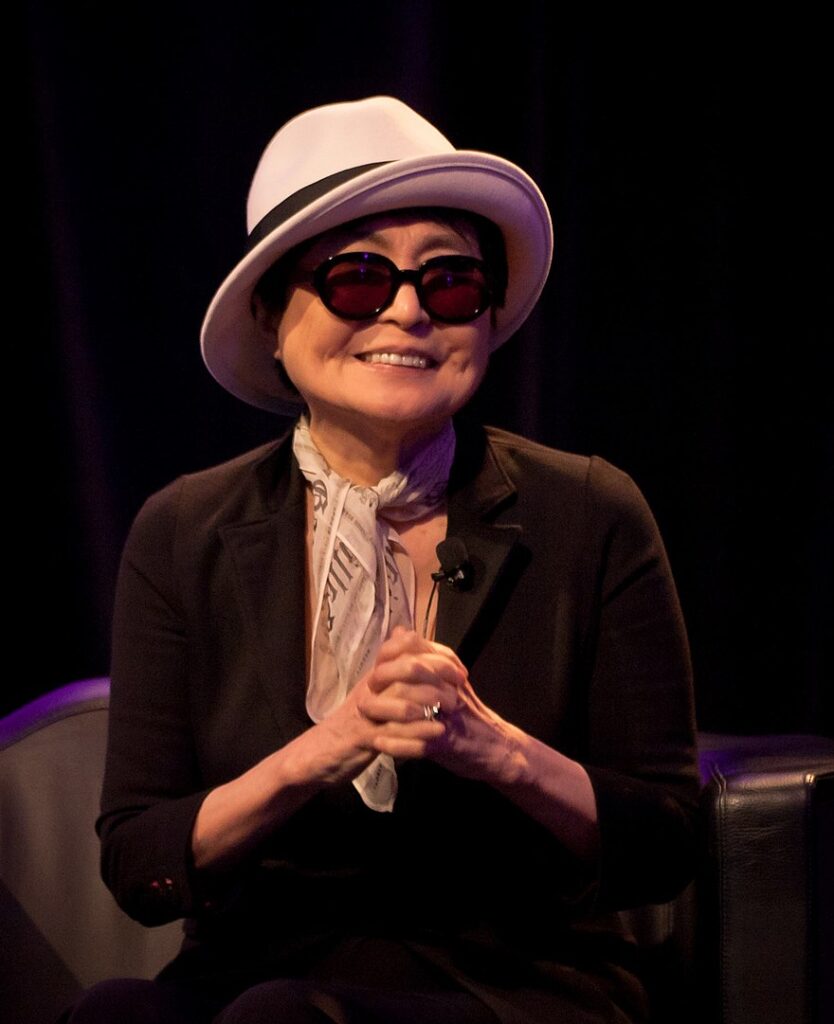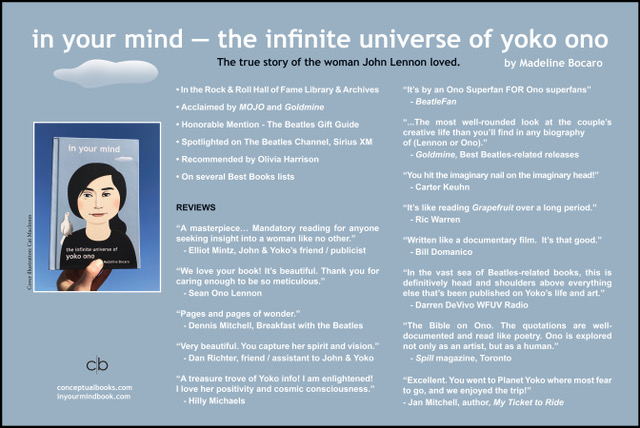
Explore the life of Yoko Ono through the lens of her critically acclaimed biography, “In Your Mind: The Infinite Universe of Yoko Ono’. Its author Madeline Bocaro speaks to Jason Barnard about her lifelong admiration for Yoko, countering unfounded criticisms and connecting her life with John Lennon’s legacy.
Can you share the inspiration behind writing ‘In Your Mind’? What prompted you to delve into Yoko’s life in such detail?
I have admired Yoko since 1968, when I was ten years old. The constant criticism of her work and personal attacks based upon lies printed in the media became very upsetting to me. She has done very important work, and strives toward a peaceful world for all of us. Yoko is basically a humanitarian. Her true story needed to be told.
Given your extensive background in rock and roll journalism, how did your passion for the genre inform your approach to writing about Yoko, and how does it contribute to the broader understanding of her impact on rock and roll history?
I wrote about Yoko independently of my love for music. Music is only a fragment of Yoko’s long and diverse life and work – in various media. Her albums (with and without John Lennon) are an integral part of her story, so I included chapters on each one, delving into every song. They are not placed in the back like a discography, but instead within the context of her life. Yoko’s music has been overlooked and misunderstood, but those who appreciate it have recognized her strong influence over the decades. She was originally interested in sound (twelve-tone composers, John Cage), rather than organized music. John Lennon brought her into the fold of rock music, and she took him out from all the musical restrictions he was under.
What drove you to create what is considered the definitive account of her life? What gaps or misconceptions did you aim to address?
I had collected a wealth of important information over the decades because I was so interested in Yoko’s unique, intuitive way of seeing the world. She explores different dimensions of thought. After spending precious time with Yoko, I understood what John loved about her. It was important to reveal her true nature and spirit. The misconceptions that she split the Beatles, or was not a good partner for John needed to be debunked. Every point I make is undeniably supported by facts and quotes from Yoko, John, their son Sean, and many important people who were a part of the history; Paul and Linda McCartney, Phil Spector, Pete Townshend, etc… I had been writing about Yoko’s work all my life. The book is a compilation of many short stories about her childhood, art, films, music, events, feminism and activism, her deep and intense love story with John, etc… People are finding the unconventional writing style refreshing and impactful.

In your interactions with Yoko, what aspects of her personality and spirit stood out to you the most, and how did they contribute to your admiration for her?
I admire Yoko’s warmth and kindness, her wisdom, brilliance and humor. The fact that she is closely in touch with intangible aspects of life. She values the importance of the subconscious. Yoko feels that we are losing our natural telepathic abilities because we rely too much on media. These are all things that John loved about her.
Yoko points out the importance of invisible things, like air. The Half-A-Wind Show (a room with all objects cut in half) is showing us what is missing, not what is actually there. Her mind was working like this even when she was a child. She can solve a problem just by looking at it in her own unique way – from left field. She wrote on Twitter, “Do you know what your obstacle is? The thing you thought was an obstacle might be a great help. It’s how you look at it.”
Yoko has often been misunderstood and faced unwarranted hatred. How did you navigate this aspect in your biography, and what do you think readers will gain from a more accurate portrayal of her life?
Unfortunately, the haters already have their minds made up, and probably will not read my book. They would find out that their opinions are based on mistruths. Those who are already fans and admirers will learn a lot more about her as a person. They will learn the true, important and profound meanings of her work. There are many, many important and fascinating details, way beyond what most people know.
Your book covers Yoko’s pre-John Lennon years extensively. What discoveries did you make about her early life, heritage, and artistic endeavors that surprised you or may surprise readers?
Yoko was born in 1933 in Tokyo, into one of the wealthiest families in Japan. Like John, she suffered from parental abandonment (she did not meet her dad until she was almost three years old, as he was working in America). Her mother was a busy socialite. She had an extremely lonely childhood. During the WWII bombings of Tokyo, she and her two younger siblings were evacuated to the countryside for safety, where they were starving, and foraged for food in an abandoned farmhouse, returning to a completely devastated Tokyo. This impermanence – the fact that everything could be destroyed in an instant – inspired her work. Her family moves to New York state when she is nineteen. She stages events in New York City while working odd jobs, falls in with the Fluxus crowd, meets her first husband (composer Toshi Ichiyanagi) via John Cage, and organizes the first space in which avant-garde artists can perform. She soon becomes lost in a man’s world, returns to Japan dejected, meets her second husband and later meets John Lennon before the opening of her first gallery show in London, in November 1966.
Yoko’s influence on John Lennon’s music is often understated. Can you elaborate on the impact she brought to John’s music?
Yoko freed John to put his opinions, emotions – even his pain into the music, and to say more important things about his world view, which he was not allowed to do within the Beatles. John gave Yoko a root to her music – a beat. They traded off and merged each other’s styles and created some incredible music together and individually. Yoko’s conceptual art and imaginings inspired John’s song ‘Imagine.’ She was finally given co-writing credit in 2017.
Yoko cares very much about John’s fans (even after his death). She protects and extends his legacy, releasing his music and art. She has personally answered letters from many of John’s fans, and has looked after those who needed help.
The concept of wind and nature in Yoko’s life and work is a recurring theme. How do you see these elements shaping Yoko’s artistic vision, and what role do they play in her overall philosophy?
Nature is an important part of Japanese culture. Yoko was raised to believe that everything in nature has a soul, and should be respected. The sky was the only constant source of beauty and permanence for her during the war, so it means a lot. It is featured in many her works, such as Sky Landing in Chicago. Water flows through her art pieces as well, because it sustains, thinks, feels and heals. Air, clouds, trees and light are also in her palette. Her wish trees are all over the world. Her tower of light (Imagine Peace Tower) shines in Iceland from John’s birth date (October 9th) to his death date (December 8th) every year. She created Strawberry Fields, a memorial garden for John in Central Park, asking for donations of indigenous seeds and plants from countries worldwide. Yoko encourages us to learn from nature by telling us, “Things in nature survive without even thinking. They absorb the nutrients they need, and do not let in negativity. We are naturally occurring organisms and we must do the same.”
You’ve mentioned Yoko’s separation from John in the 1970s and Paul’s role in bringing them back together. Why do you think this story has been overlooked, and what impact might this revelation have on people’s understanding of their relationships?
It was not mentioned publicly until Yoko spoke about it in an interview in 2010. It sat there quietly, without many people picking up on it. The story was overlooked because people wanted to continue believing that there was great discord between Yoko and Paul, and even between John and Paul. They had difficult relationships, but there was deep love all around.
Yoko’s work often challenges traditional boundaries between art and life. How do you think her avant-garde approach has impacted the art world, and what do you hope readers will take away from her unconventional philosophy?
There are many more avant-garde artists now, partly because of the innovative work that Yoko pioneered. Her unconventional approach will make complete sense to readers when they see it the context of her life and work. She is awakening us to our own inner power, and to our extremely misplaced values. Yoko shows us that most of the things in this society are things we don’t really need for our existence.” For instance, she points out that water is much more valuable than gold. Most of her work is about giving. She says, “I think it is better to concentrate on what you do as an artist, than to pursue acceptance from the world. It’s a waste of time to concentrate your energy on that. The acceptance will come when they need what you have produced or be amused enough by your work in the boredom of their lives. Keep your pride and dignity as the giver, and not a taker. As the giver, we are creating the future of our world.”
Yoko’s life has been intricately connected with John’s legacy. How do you imagine Yoko’s life might have unfolded without the weight of John Lennon’s influence?
Yoko would have been appreciated a lot sooner, had she not met John and been side-tracked by her collaborations with him. She was way ahead of her time, and would have produced a lot more work on her own. On the other hand, I am not sure that either of them would have survived without each other. Individually, they were isolated, broken and alone. Together, they were invincible.
Her activism and feminism are highlighted in your book. How do you see her contributions in these areas resonating with contemporary social and political movements?
She was way ahead of her time as a pioneering feminist. Her grandmother was part of a feminist group in Japan. She brought John with her to the first International Feminist Conference in 1973. Many of her songs are feminist anthems. This was part of the discrimination she faced as a woman, for standing up for women’s rights. Contemporary women’s movements are growing and spreading. But Yoko always encourages women to fight more gently and not to be militant or aggressive, because that is the biggest mistake made by men. Yoko still views women as the more powerful sex. She also dispelled a myth that all men would like us to believe. “You ask any woman. No woman ever went through penis envy. We never did. The books say we’re supposed to, but look who wrote the books.”
Her reputation has evolved over the years. How have you witnessed this transformation, especially in the last two decades? What factors have contributed to a more positive view?
Younger people are receptive to her work because they have not been pre-conditioned by all the lies. They think that she is hip and cool, and love her style. They don’t’ realize that she is now a 91- year-old woman! It has an inherent innocence that children and teens relate to. Her work is timeless and therapeutic. Worldwide exhibitions of her work have become increasingly frequent, such as the big retrospective that recently opened at Tate Modern in London. Being immersed in Yoko’s pure white rooms and absorbing her positive messages helps people to understand that she was always fighting the good fight, for a peaceful world. They come away enlightened.

Finally, ‘In Your Mind’ has been really well received critically and by those around Yoko and The Beatles. Can you tell me a little more about that?
Yoko’s friends and colleagues are loving the book because the truth has been revealed. It is an homage to a very important artist and a person whom they cherish and respect. They appreciate all the indisputable facts, and deep-dives into her work and her mind (much of it in Yoko’s own voice) that they were not aware of. There are many revelations. Yoko was struggling with so much negativity in her life, that she had to develop unique methods of coping. These life lessons are enchanting, and have been useful to everyone who has read the book.
Further information
In Your Mind – The Infinite Universe of Yoko Ono: The true story of the woman John Lennon loved.
inyourmindbook.com
conceptualbooks.com
Social Media: linktr.ee/conceptualbooks




